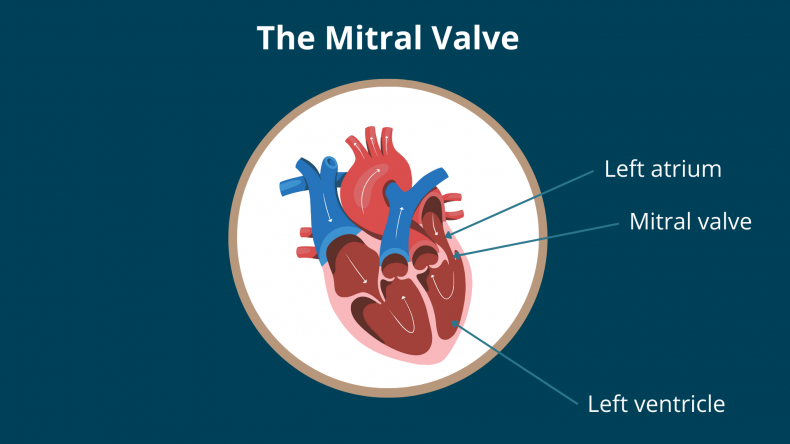Mitral valve disease is a group of heart conditions in which the mitral valve doesn’t work correctly. Mitral valve disease affects blood flow through your heart. It impairs its ability to pump the oxygen-rich blood your body needs.
Although many people with mitral valve disease may have no symptoms, it can cause uncomfortable symptoms that affect your health, well-being and quality of life. Your symptoms will depend on the type of mitral valve disease you have and the severity of the valve damage. However, some people can be asymptomatic even with a severe valve problem that needs treatment.
“Mitral valve disease can progress slowly, and symptoms can be subtle or non-specific. However, the heart still has to work much harder to overcome the valve problem, which puts it under strain and causes damage over time. If mitral valve disease is left untreated, it can result in serious complications, including heart failure and abnormal rhythms that can be life-threatening,” explains our cardiology consultant, Dr Ali Vazir.
If you’re worried about your heart health, arrange a check-up with your GP or a specialist cardiologist. Experienced doctors can often pick up valve problems by listening to your heart with a stethoscope. They may identify characteristic murmurs, clicks and sounds that can indicate disease in one of your heart valves.
Mitral valve prolapse symptoms
“If you have mitral valve prolapse, your mitral valve will become floppy, making it bulge backwards when it closes. Many people with mitral prolapse do not notice any symptoms,” explains Dr Vazir.
If mitral valve prolapse does cause symptoms, they can include:
- feeling dizzy or lightheaded
- fatigue
- palpitations – a feeling like your heart is skipping a beat, racing or beating too hard
- shortness of breath
- coughing
- a feeling of anxiety, like a panic attack
Mitral valve prolapse can get worse over time, and it can cause mitral regurgitation, where the valve is leaky and flows back into the atrium. Uncommonly mitral valve prolapse can cause:
- cardiac arrhythmias: potentially life-threatening heart rhythm disturbances that can cause palpitations, chest pain, dizziness, collapse and sudden death
- infective endocarditis: a serious heart valve infection
stroke - congestive cardiac failure: your heart cannot pump the blood your body needs, making you feel weak, tired, and breathless and developing swelling in the feet and ankles and lung congestion
However, most people with mitral valve prolapse will have no long-term medical problems linked to the condition and an average life expectancy.

Mitral valve regurgitation symptoms
If you have mitral regurgitation, the mitral valve becomes leaky, allowing blood to flow incorrectly in the heart.
Many people with mitral regurgitation don’t experience any symptoms. However, it can involve symptoms such as:
- dizziness
- chest pain
- fatigue
- palpitations- a feeling like your heart is skipping a beat, racing or beating too hard
- shortness of breath and rapid breathing.
Untreated or severe mitral regurgitation can cause complications, including:
- thrombosis: severe regurgitation can make blood clots form; these may travel to the lungs, causing a dangerous pulmonary embolism or brain, causing a stroke
- heart failure: the valve dysfunction strains the heart; it has to work harder to pump blood. Over time the heart can fail, which means it can’t pump the blood your body needs. You will feel weak, tired and breathless. You may also develop swelling in the feet and ankles and congestion in the lungs, which causes breathlessness and coughing, which is worse on lying down
- atrial fibrillation: a fast and irregular heartbeat
- pulmonary hypertension: raised blood pressure in the blood vessels supplying the lungs
- cardiac arrhythmias: potentially life-threatening heart rhythm disturbances that can cause palpitations, chest pain, dizziness, collapse and sudden death
- endocarditis: infection of the valve
Mitral valve stenosis symptoms
“If you have mitral stenosis, the mitral valve becomes narrowed and obstructs blood flow from the left atrium to the left ventricle,” explains Dr Vazir.
Many people with mitral stenosis don’t notice any symptoms. However, it can cause symptoms including:
- feeling dizzy and lightheaded
- fatigue
- chest pain
- palpitations – a feeling like your heart is skipping a beat, racing or beating too hard
- shortness of breath
- cough, sometimes coughing up blood
Severe complications of mitral stenosis include:
- cardiac arrhythmias: in mitral stenosis, the valve can’t open as wide as it should. The narrowed valve obstructs the blood flow. The left atrium is stretched by all the extra blood, which can disturb the heart’s electrical pathways and cause rhythm disturbances that can be life-threatening
- pulmonary hypertension: the narrowed valve makes blood back up in the lungs, causing breathlessness and increasing the blood pressure in the blood vessels in the lungs
- heart failure: the heart has to work harder to pump blood from the lungs, which can strain the heart over time and cause heart failure, where your heart cannot pump enough blood for your body’s needs. You will feel weak, tired and breathless. You may also develop swelling in the feet and ankles and congestion in the lungs, which causes breathlessness and coughing, which is worse on lying down
- endocarditis: as with all valve problems, mitral stenosis increases your risk of developing endocarditis, a serious valve infection
If you are experiencing any of these symptoms, it’s essential to see a cardiologist or your GP as soon as possible to get a diagnosis. We provide a range of lung and heart treatments, using invasive and non-invasive procedures.
Contact us
For more information or to book an appointment, please contact our customer care team.
